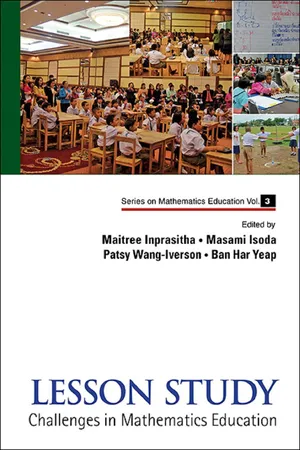
Lesson Study
Challenges in Mathematics Education
- 392 pages
- English
- ePUB (mobile friendly)
- Available on iOS & Android
Lesson Study
Challenges in Mathematics Education
About this book
Classroom Innovations through Lesson Study is an APEC EDNET (Asia-Pacific Economic Cooperation Education Network) project that aims to improve the quality of education in the area of mathematics. This book includes challenges of lesson study implementation from members of the APEC economies.
Lesson study is one of the best ways to improve the quality of teaching. It is a model approach for improvement of teacher education across the globe. This book focuses on mathematics education, teacher education, and curriculum implementation and reforms.
Contents:
- The Role of Lesson Study in Overcoming Challenges in Mathematics Education:
- Mathematics Education for the Knowledge-Based Society (Alan J Bishop)
- Mathematical Thinking for Classroom Decision Making (Kaye Stacey)
- Setting Lesson Study within a Long-Term Framework of Learning (David Tall)
- Lesson Study: An Essential Process for Improving Mathematics Teaching and Learning (Akihiko Takahashi)
- Comparative Study of Mathematics Classrooms — What can be Learned from the TIMSS 1999 Video Study? (Frederick K S Leung)
- The Science of Lesson Study in the Problem Solving Approach (Masami Isoda)
- Preparing Ground for the Introduction of Lesson Study in Thailand (Maitree Inprasitha)
- Perspectives on Lesson Study and Professional Development:
- History of Lesson Study to Develop Good Practices in Japan (Shizumi Shimizu & Kimiho Chino)
- What have We Learned about Lesson Study Outside Japan? (Catherine Lewis)
- Enhancing Mathematics Teachers' Professional Development through Lesson Study ~ A Case Study in Singapore ~ (Ban-Har Yeap, Peggy Foo & Poh Suan Soh)
- Using Lesson Study to Develop an Approach to Problem Solving: Adding and Subtracting Fractions (Kazuyoshi Okubo & Hiroko Tsuji)
- Prospective Teacher Education in Mathematics through Lesson Study (Maitree Inprasitha)
- In-service Teacher Education in Mathematics through Lesson Study (Soledad A Ulep)
- Lesson Study for Illustrating Innovative Approaches in the Classroom:
- Transforming Education through Lesson Study: Thailand's Decade-Long Journey (Maitree Inprasitha)
- Mathematics Teachers Professional Development through Lesson Study in Indonesia (Marsigit)
- Lesson Study in Chile (Grecia Gálvez)
- Initiating Lesson Study to Promote Good Practices: A Malaysian Experience (Chap Sam Lim & Chin Mon Chiew)
- Using Lesson Study as a Means to Innovation for Teaching and Learning Mathematics in Vietnam: Research Lesson on the Property of the Three Medians in a Triangle (Tran Vui)
- Lesson Study in Singapore: A Case of Division with Remainder in a Third Grade Mathematics Classroom (Yanping Fang & Christine Kim Eng Lee)
- Enabling Teachers to Introduce Innovations in the Classroom through Lesson Study (Soledad A Ulep)
- What is a Good Lesson in Japan? An Analysis (Takeshi Miyakawa)
- Using Lesson Study to Connect Procedural Knowledge with Mathematical Thinking (Patsy Wang-Iverson & Marian Palumbo)
Readership: Mathematics educators of teacher training colleges, mathematics teachers, prospective teachers (elementary and secondary school) and undergraduate students in mathematics.
Key Features:
- Presents the world reform movement by top researchers
- Includes the challenges of lesson study and videos of model lessons in the world (lesson videos will be available on the website: http://www.criced.tsukuba.ac.jp/math/apec)
- Includes the Japanese teaching methods called “problem-solving approaches”
Tools to learn more effectively

Saving Books

Keyword Search

Annotating Text

Listen to it instead
Information
Section 1
The Role of Lesson Study in Overcoming Challenges in Mathematics Education
SECTION 1.1
MATHEMATICS EDUCATION FOR THE KNOWLEDGE-BASED SOCIETY
1. WHAT AM I OFFERING IN THIS CHAPTER?
2. DEFINITION OF KNOWLEDGE-BASED SOCIETY
3. HOW TO CONSIDER EDUCATION IN THIS NEW CONTEXT?
4. KINDS OF EDUCATION => KINDS OF MATHEMATICS EDUCATION
Table of contents
- Cover Page
- Title Page
- Copyright
- Contents
- Foreword
- Section 1: The Role of Lesson Study in Overcoming Challenges in Mathematics Education
- Section 2: Perspectives on Lesson Study and Professional Development
- Section 3: Lesson Study for Illustrating Innovative Approaches in the Classroom
- Contributors
Frequently asked questions
- Essential is ideal for learners and professionals who enjoy exploring a wide range of subjects. Access the Essential Library with 800,000+ trusted titles and best-sellers across business, personal growth, and the humanities. Includes unlimited reading time and Standard Read Aloud voice.
- Complete: Perfect for advanced learners and researchers needing full, unrestricted access. Unlock 1.4M+ books across hundreds of subjects, including academic and specialized titles. The Complete Plan also includes advanced features like Premium Read Aloud and Research Assistant.
Please note we cannot support devices running on iOS 13 and Android 7 or earlier. Learn more about using the app